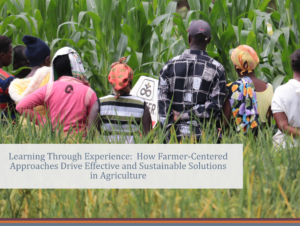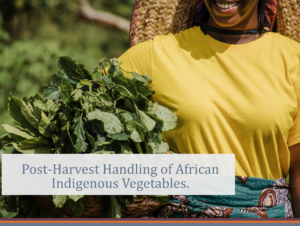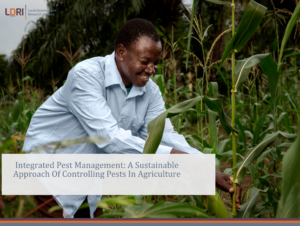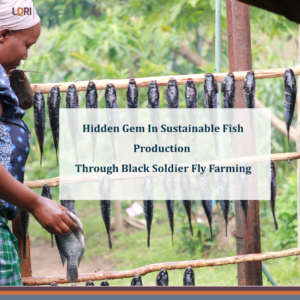![]()
Adoption of Better Inputs a Path Towards Food Security.

In the face of population pressure and dwindling land resources, increase in agricultural production is crucial in achieving food security among rural populations. Maize is an important food security cereal crop in Kenya. It is a staple food for an estimated 50% of the population and a vital source of carbohydrate, protein, iron, vitamin B and minerals. Kenyans consume maize in a wide variety of ways, with Ugali, Mukimo, Muthokoi and Githeri being the meals on most dinner tables. It is also an important livestock feed both as silage, a crop residue grain and is also industrially for starch extraction. The production of this precious grain can barely keep up with the demand.
It is estimated that 80% of smallholder farmers in Kenya rely on agriculture for their livelihoods. Most of these farmers rarely observe good agronomic practices (GAPs) while growing maize. This may have adverse effects on their maize yields; as yields are directly related to GAPs applied, weather patterns and most importantly the choice of maize variety planted. Current maize harvests are not able to last till the next cropping season, posing serious food security threats to most of the households. Since maize production is already operating at its land frontier with limited scope to increase supply of land to meet the growing demand for maize, future increases in maize production will depend on increasing yield per hectare through the use of improved maize varieties and better agronomic practices.
Among the many initiatives in increasing the productivity of maize as part of achieving food security, the aforementioned practices have been the most profound. Since time in memorial, smallholder farmers have been using the local or rather the indigenous varieties. These varieties have been doing very well for quite some time, however, climate change has adversely affected the rain-fed farming system. Prolonged periods of drought coupled with low soil fertility, changing levels of soil PH, persistent weeds and pest infestation has led to decline in yields of local varieties. For this reason, researchers have developed new improved hybrid varieties on the basis of altitude, rainfall, type of soil and temperature, that are suitable for the radical changes in climatic and environmental conditions. These varieties are drought tolerant, high yielding, early maturing and are pest and disease resistant. In short, improved maize varieties were tailor-made to meet the needs of farmers in every climatic region, thus area specific.
Most smallholder farmers have had many years experience in maize farming but planting the indigenous maize varieties as opposed to the improved varieties. The adoption of improved maize varieties has been a challenge due to lack of information on its availability and best practices. In instances where farmers used hybrid maize varieties, they selected varieties without full knowledge of the ecological requirements necessary for those varieties. Incorrect choice of maize variety can be costly in terms of missed opportunity to produce the maximum feed energy from the crop.
Farmers in Kiambu and Embu counties have had an opportunity to conduct trials of these improved maize varieties for four seasons now, since September 2019, through the Village Based Advisors Project (VBA) under the Extension Support Program (ESP) being implemented by Local Development Research Institute (LDRI), Kiambu and Embu County Governments and input companies that have partnered with LDRI. The project has helped mitigate some of the aforementioned challenges farmers would face with the transition from indigineous maize variety to improved maize variety. This has been done through training farmers on GAPs, introducing them to high yielding improved maize varieties, whereby farmers establish demos on their farms and through observation of the performance of these varieties, they gain hands-on experience and make informed decisions on which varieties best suit their farming needs.
 Lucy (Photo above) is a VBA from Kiringa Village in Kagaari South Ward, Runyenjes sub-county in Embu County. Before she was introduced to the VBA Project, Lucy used to plant “recycled” local maize variety, also known as “Muthanduro” in the local dialect. On her 2-acre piece of land, Lucy planted 10 kgs of local maize seeds at a spacing of 90cmx60cm with a seed rate of 2 seeds/hole. She also applied manure and 50kgs of DAP fertilizer during planting. When the crop reached 4 leaves, Lucy did not use any fertilizer to top-dress as she thought that the fertilizer she used during planting provided the necessary nutrients for the plant till maturity. After about 4 months, Lucy harvested 7 bags of 90kg dry maize grain. In September 2019, Lucy was introduced to the VBA project and trained on GAPs, selection of appropriate maize varieties for her region, types and application of fertilizer. She received sample seeds to conduct trials on her farm. In the October 2020 season, she bought 16kg of Haraka WH 101 maize variety from Western Seed Company and planted on her 2-acre farm, at a spacing of 75cmx25cm with a seed rate of 1 seed/hill. She applied 100kg of MiCrop planting fertilizer from Yara East Africa and later on top-dressed with 100kg of CAN. To ensure that her crops were not infested with pests such as FallArmy Worm, Lucy applied Pruffen.
Lucy (Photo above) is a VBA from Kiringa Village in Kagaari South Ward, Runyenjes sub-county in Embu County. Before she was introduced to the VBA Project, Lucy used to plant “recycled” local maize variety, also known as “Muthanduro” in the local dialect. On her 2-acre piece of land, Lucy planted 10 kgs of local maize seeds at a spacing of 90cmx60cm with a seed rate of 2 seeds/hole. She also applied manure and 50kgs of DAP fertilizer during planting. When the crop reached 4 leaves, Lucy did not use any fertilizer to top-dress as she thought that the fertilizer she used during planting provided the necessary nutrients for the plant till maturity. After about 4 months, Lucy harvested 7 bags of 90kg dry maize grain. In September 2019, Lucy was introduced to the VBA project and trained on GAPs, selection of appropriate maize varieties for her region, types and application of fertilizer. She received sample seeds to conduct trials on her farm. In the October 2020 season, she bought 16kg of Haraka WH 101 maize variety from Western Seed Company and planted on her 2-acre farm, at a spacing of 75cmx25cm with a seed rate of 1 seed/hill. She applied 100kg of MiCrop planting fertilizer from Yara East Africa and later on top-dressed with 100kg of CAN. To ensure that her crops were not infested with pests such as FallArmy Worm, Lucy applied Pruffen.
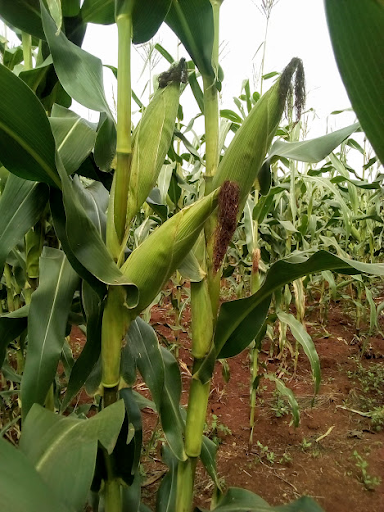 (Lucy’s Farm showing Haraka 101 Maize Variety).
(Lucy’s Farm showing Haraka 101 Maize Variety).
After 75 days, Lucy harvested 60 bags of 90kgs dry maize grain and she was amazed and impressed by how the crop had performed. She used Hermetic bags to store her produce till the next season. Her experience with improved varieties made Lucy confident, especially when she was training her fellow farmers on GAPs and issuing small packs to them to conduct trails on their farms. Farmers in her village had seen positive results from her farm and by conducting trials, they also had first-hand experience with the varieties. Over time, the demand for improved maize varieties in her village increased, which created a business opportunity for Lucy to sell farm inputs to her farmers. She opened an agro-dealer shop in order to serve her customers efficiently. Through the VBA Project initiative, Lucy was not only food secure but was also able to earn an income.
Lucy had this to say, “ I used to plant local maize varieties that took longer time to mature in the field. With the improved varieties, the crop takes a shorter time and cases of pest infestations are fewer. My farmers are happy with the varieties that I have introduced to them. I had planned on opening an agro-dealer shop at some point but because of the positive feedback and increased demand for the maize varieties, I found myself opening it sooner than anticipated, which was a good thing. All in all, I am grateful to the donors and implementers of the VBA Project.”
Over 200,000 smallholder farmers in Kiambu and Embu County have tried the improved maize varieties under the recommended good agricultural practices. As a result, most of them have abandoned the local varieties which are late maturing and low yielding for the early maturing and high-yielding varieties, which are currently in high demand. Farmers’ production levels have also doubled thus improving their household food security. We are not just improving agriculture,we are improving lives and that for us is a double win.

